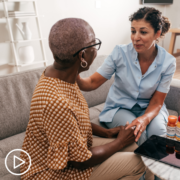Should Some Gynecologic Cancer Patients Seek a Specialist?
Should Some Gynecologic Cancer Patients Seek a Specialist? from Patient Empowerment Network on Vimeo.
Why might some gynecologic cancer patients want to see a specialist? Expert Dr. Charlotte Gamble from MedStar Health explains the reasoning of seeing a specialist and why a specialist may not be seen in some areas.
Download Guide | Descargar Guía en Español
See More from [ACT]IVATED Endometrial Cancer
Related Resources:

|

Advancements in Endometrial Cancer Trials | Insights and Opportunities |

|
Transcript:
Lisa Hatfield:
A lot of people in our audience are going to community facilities for their care. Do you recommend for patients who are diagnosed with any type of gynecologic cancer to seek out a specialist or a subspecialist to get more information or do you feel confident that they can ask these questions if they’re a local oncologist, if they do not specialize, if they’re more of a general oncologist versus a specialist?
Dr. Charlotte Gamble:
This is such a nuanced question and is probably a little bit controversial within the oncology sphere. So endometrial cancer is a gynecologic cancer. And because of that, historically, the providers that have the most specific expertise in that area have traditionally been gynecologic oncologists. These are both surgeons as well as oncologists that do the surgery as well as the chemotherapy or the targeted therapy. We are now in a space where sometimes that care is a little bit fractioned, and there’s different ways of practicing within this realm of gynecologic oncology throughout the country.
And so some health systems have gynecologic oncologists, more of the surgeons that work very closely in partnership with medical oncologists that might treat specifically gynecologic cancers, or sometimes are more general medical oncologists that treat multiple different kinds of cancers. I would say that, and then there are some places where gynecologic oncologists do it all.
So I actually work in a hybrid system where I, in one hospital that I work at, I’m the gynecologic oncologist and do both the surgeries as well as the chemotherapy. And then at a community site that I work with, I do the surgeries and I work closely with general medical oncologists who are able to provide the chemotherapy or the targeted therapies.
I would say that for patients who are receiving care within a general medical oncology practice, a very good question to ask their medical oncologist would be, are you in contact or how closely do you work with gynecologic oncologists in terms of taking care of patients with gynecologic cancers? Because traditionally, medical oncologists might not receive the depth of education in gynecologic cancers that gynecological oncologists actually need to go through and that patients deserve. And I have worked with several medical oncologists who are absolutely wonderful, but it is a close partnership that we are making these plans together and they understand the gynecological oncology literature and I’m able to guide those therapies for my patients.
Lisa Hatfield:
That’s great clarification for patients who might be facing this disease and a great question they can pose to their local oncologist. So thank you for that.






